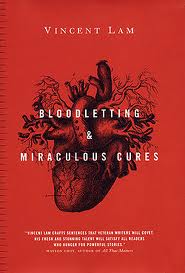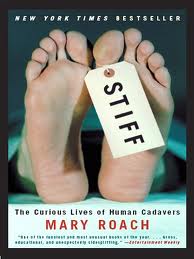
In the months leading up to the beginning of school, I found myself in possession of two books that dealt with the topic of anatomy lab. The first book is Bloodletting and Miraculous Cures by Vincent Lam, which is a series of short stories about the life of a medical practitioner from pre-med to professional. In one of the stories, a group of medical students are in the anatomy lab, dissecting a cadaver, and one of the students expresses that he is uncomfortable cutting through a tattoo on the cadaver’s chest, as he believes that symbols are sacred. Until I read this, I had not fully considered what it would be like to be in a room with dead bodies, and possibly cutting into them. After reading this story, I had a new anxiety about what is called “dead lab.” Would I faint? Throw up? Cry? Have to leave the room? How would I feel if I saw tattoos on the cadaver? Could I separate the scientific from the personal? Not having dissected anything since I was in the 8th grade, when we dissected a sheep’s eyeball, I was justifiably concerned about the dramatic leap to dead human beings.

This anxiety was confirmed when I picked up a second book called Stiff: the Curious Lives of Human Cadavers by Mary Roach, in which she graphically depicts a room full of disembodied heads – in use by students of cosmetic surgery. Was I too going to have to cut into a dead head? Could I handle it?
Strangely, when I daydreamed about anatomy lab, the single lesson I thought would be my greatest challenge was reproductive anatomy. It seemed to me too violent a gesture to slice into a man’s penis, or to cut into the sides of a woman’s vaginal cavity. And it’s possible that if we had started out our anatomy course with reproductive anatomy, I might well have done all of the following: cried, thrown up, run out of the room, and fainted. However, having spent several months in the lab already, I was nice and desensitized when I got my reproductive anatomy lesson only today. (And it softens the experience that we do not ourselves do the dissections, but instead just look at those that have been done for us by a team of talented [and brave?] upper-level students.)
I guess it’s not all that rare to get to stand in a room full of cadavers and see for one’s self what’s under the skin of a human being. All medical students have this experience, and yet when I’m standing in the lab, I feel my position is both privileged and unique. And I felt this way today, staring at a sagittal section of a penis and identifying parts. I expressed curiosity about the cross-section of the penis, since none of the cadavers offered this perspective, so the TA promptly collected a scalpel and cut through the penis on some poor cadaver “just for me.” I can’t deny that I found the experience both slightly disturbing and yet oddly exhilarating. So now I know the ins and outs of the penis, and this is a good thing, as apparently there is a possibility that naturopathic doctors may be performing vasectomies in due time. (And as far as the female reproductive anatomy goes, I’m sad to report that all of our female cadavers were lacking their uterus and ovaries due to hysterectomies.)
All of this to say that in spite of my anxieties heading into my anatomy lab course, I have yet to faint, throw up, or cry. I have had to leave the room on occasion, and I have hovered near the window when necessary (the fumes can be a bit much). In the beginning, I did find myself getting emotional about the persons behind the bodies. I found myself wondering “What friends and family were in that woman’s life, and did they hold that hand in her dying days? Did some man put a ring on that finger once upon a time?” But I quickly learned to detach and to study the bodies for the educational tools they are.
This course is also confirming for me the sense that our bodies are, in fact, not ourselves. They are the vessels we inhabit while we exist on this earth, and we should do our best to care for them as lovingly as possible, as our care or lack thereof will greatly impact our experience of life. Through this course, I am finding that any previous hang-ups I had about my body are nonsensical, and I am happy to report that I feel them dissolving effortlessly away. I (and we) ought to simply enjoy and admire our bodies for the mind-bogglingly amazing and complex organisms they are!
Side note: Last quarter one of the NDs who teaches at NCNM provided us with a regime to follow in order to keep our livers safe from the toxic chemicals encountered in dead lab. How many medical students can say the same? I love my school!!
Strangely, when I daydreamed about anatomy lab, the single lesson I thought would be my greatest challenge was reproductive anatomy. It seemed to me too violent a gesture to slice into a man’s penis, or to cut into the sides of a woman’s vaginal cavity. And it’s possible that if we had started out our anatomy course with reproductive anatomy, I might well have done all of the following: cried, thrown up, run out of the room, and fainted. However, having spent several months in the lab already, I was nice and desensitized when I got my reproductive anatomy lesson only today. (And it softens the experience that we do not ourselves do the dissections, but instead just look at those that have been done for us by a team of talented [and brave?] upper-level students.)
I guess it’s not all that rare to get to stand in a room full of cadavers and see for one’s self what’s under the skin of a human being. All medical students have this experience, and yet when I’m standing in the lab, I feel my position is both privileged and unique. And I felt this way today, staring at a sagittal section of a penis and identifying parts. I expressed curiosity about the cross-section of the penis, since none of the cadavers offered this perspective, so the TA promptly collected a scalpel and cut through the penis on some poor cadaver “just for me.” I can’t deny that I found the experience both slightly disturbing and yet oddly exhilarating. So now I know the ins and outs of the penis, and this is a good thing, as apparently there is a possibility that naturopathic doctors may be performing vasectomies in due time. (And as far as the female reproductive anatomy goes, I’m sad to report that all of our female cadavers were lacking their uterus and ovaries due to hysterectomies.)
All of this to say that in spite of my anxieties heading into my anatomy lab course, I have yet to faint, throw up, or cry. I have had to leave the room on occasion, and I have hovered near the window when necessary (the fumes can be a bit much). In the beginning, I did find myself getting emotional about the persons behind the bodies. I found myself wondering “What friends and family were in that woman’s life, and did they hold that hand in her dying days? Did some man put a ring on that finger once upon a time?” But I quickly learned to detach and to study the bodies for the educational tools they are.
This course is also confirming for me the sense that our bodies are, in fact, not ourselves. They are the vessels we inhabit while we exist on this earth, and we should do our best to care for them as lovingly as possible, as our care or lack thereof will greatly impact our experience of life. Through this course, I am finding that any previous hang-ups I had about my body are nonsensical, and I am happy to report that I feel them dissolving effortlessly away. I (and we) ought to simply enjoy and admire our bodies for the mind-bogglingly amazing and complex organisms they are!
Side note: Last quarter one of the NDs who teaches at NCNM provided us with a regime to follow in order to keep our livers safe from the toxic chemicals encountered in dead lab. How many medical students can say the same? I love my school!!
 RSS Feed
RSS Feed